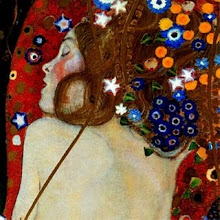Nepenthe was a term introduced in Homer's Odyssey. (Rhapsody D, to be specific) Literally, it means "the one that chases away sorrow" (ne: not, penthe: grief, sorrow, mourning) In the Odyssey, "Nepenthes pharmakon" (i.e. a drug that chases away sorrow) is a magical potion given to Helen by an Egyptian queen. It quells all sorrows with forgetfulness. Personally, given the amount of control Helen seemed to have over her life, I'm kind of thinking I'll give her the benefit of the doubt on going that route. More on that concept of being in control of your own life later.
This blog actually takes its name from the poem The Triumph of Life by Percy Bysshe Shelley. To wit:
A shape all light, which with one hand did fling
Dew on the earth, as if she were the Dawn
Whose invisible rain forever seemed to sing
A silver music on the mossy lawn,
And still before her on the dusky grass
Iris her many coloured scarf had drawn.—
In her right hand she bore a crystal glass
Mantling with bright Nepenthe...
Of course, Nepenthe has been mentioned in many other poems, including Poe's The Raven and Tracie Morris's Writers Are My Nepenthe. Though I concur with Tracie Morris on the issue, I'm sticking with Shelley on the title. It's interesting though that a lot of people seem to think that Nepenthe should be equated with poison. Witness illustrator Krista Huot's imagery for her January show in San Francisco:
Some days, just like Huot's Snow White, you're left wondering whether or not it wouldn't be better to just bite the apple.
I saw this little pseudo-feminist opium-infused flick yesterday called Alice in Wonderland. Directed by that inconsistent goth girl-loving Tim Burton. His revisionist Alice is cast in simplistic terms as some sort of neo-Victorian feminist, rejecting an unappealing marriage partner and following in her father's footsteps. I guess if the actual plot and action weren't so poorly done, it might fly, except for the part that we see the fighting sisters, the Red Queen and the White Queen, squabbling over the crown to the kingdom and Alice not really being in control of her own life as much as she thought. The Red Queen is ugly and therefore obviously evil, and the White Queen, a kind of Martha Stewart-style Glinda the Good Witchesque fragile flower, has to get someone else to do what she could do with her own magic but is just too special and good to do. Nope, she's going to get the 19 year old girl to settle things for her. So Alice has to do the dirty work, whether she wants to do it or not. The three feminine archetypes in this film were just so unbearably annoying to me. I couldn't wait for it to be over. And no amount of purdy CGI was going to make me rapt. I'm already amazed by the fact that several people I know are saying that this revisionist Alice is so empowering and that wow, I am just too literal. I guess I'm just weary of faux-feminism and faux-niceness.
Apple, anyone?























No comments:
Post a Comment